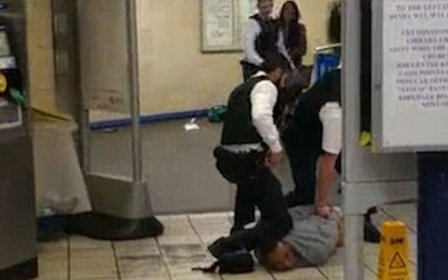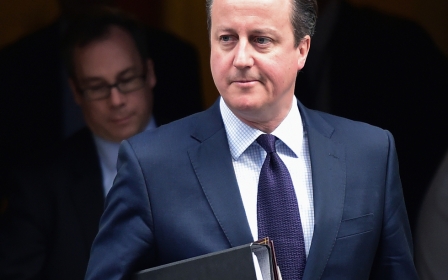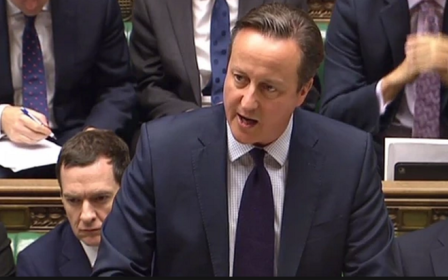Leytonstone community in 'shock and fear' after London stabbings

LONDON - Leytonstone Underground Station, site of Saturday night’s violent stabbing attack, had returned to some kind of normality by Sunday morning. Passengers at the busy station witnessed unimaginable scenes at around 19:00 on Saturday night, when a knife-wielding man stabbed three people, allegedly slashing one of them in the throat. He screamed “This is for Syria” as he launched the attack.
Less than 24 hours after the stabbing, the station bore no physical traces of the bloodshed, with four police officers with tasers in the vicinity the only real reminder of what had happened.
But the attack has shocked residents in this usually quiet multicultural community, with many wondering what the longer term ramifications will be.
“I’m shocked,” said Sandeep, who runs a kiosk next to the station’s entrance. “I closed my shop at 18:30 last night, and by the time I got home at 19:00 this had happened. This morning I’m selling newspapers about it.”
Asmera, who moved to the area four months ago, shares the sense of shock that this north-east London suburb has been caught up in what police are investigating as a “terrorist incident”, although there has been a lot of discussion on social media about the attacker's mental state.
“It’s normally very calm here, lots of different kinds of people, very mixed. People are just living their day-to-day lives, and then they get dragged into these problems,” she said.
Many have been discussing the footage of the attack in which a Muslim passerby is heard yelling to the attacker: "You aint a Muslim bruv," with people tweeting the #YouAintNoMuslimBruv hashtag to stress London's multicultural nature.
But while many said Saturday’s attack had shattered a usually peaceful area, Leytonstone and its surrounding borough, Waltham Forest, are far from crime free. Almost one knife crime was reported daily in Waltham Forest in 2014, with 144 stabbings recorded during the period.
But this attack is viewed differently – the suspect allegedly told police as he was led away that the stabbing was a response to the UK parliament’s decision days earlier to start bombing Islamic State positions in Syria.
“The attack is definitely linked to the [UK] bombing [in Syria],” Asmera told Middle East Eye outside Leytonstone station, expressing her dismay at parliament’s decision. “It is inevitably going to have a big impact, not least on civilians. Of course we all want to take action to stop terrorism, but it feels like nobody is looking at the bigger picture.
“The world is a really scary place right now, but [since the bombing started] things have become even less secure.”
For George, an accountant who lives round the corner from the station, Saturday’s attack brings an international conflict onto the doorstep of the home where he raised his children.
“It’s disgusting – they’re bringing the war over here. I’m from Africa, but I moved here in 1972. I raised my family here, and this is very scary," he said.
“Something has to be done. Getting rid of [Syrian President Bashar] al-Assad is the priority now. He’s the real reason all this is happening – it’s nothing to do with religion. Imagine if our queen controlled everything about our lives. We’d have no choice but to rebel.”
An elderly woman who has lived in the area for decades and didn’t want to be named told Middle East Eye; “I think everyone here is feeling the same things: shock and fear.
“People will start thinking, ‘Oh, I didn’t know my neighbour was a terrorist.’”
There have been raids in the local area recently, she said, and arrests of people suspected to have links to extremist activity.
Earlier this year, parents at Buxton Primary School, whose students are mostly Muslim, were outraged when children as young as nine were asked, without parental consent, to fill in questionnaires aimed at identifying “the initial seeds of radicalisation with children of primary school age”.
But until now, the local resident says, the social fabric had remained strong.
“I have Muslim friends – it isn’t usually an issue around here. Now, people will become scared of each other,” the woman said.
The local mosque was quiet on Saturday morning, with just a few elderly men praying along the sides of the small room. A statement issued by the Leytonstone Islamic Association is pinned to a noticeboard at the entrance.
“We strongly condemn any sort of violence - Leytonstone is [a] multicultural community [where] we live in peace and harmony. The [mosque] is a place where the local community comes to offer prayers … there is no platform, event or dialogue in the [mosque] that could lead a person to commit such a crime.”
Shamim, who was waiting to collect her son from a learning centre, said there will be pressure on the local Muslim community to be seen to do more in the wake of the attack.
“In the end you have to ask, what more could we do? It’s a very scary situation, especially when you have children. I’m a Muslim, but I’m also British, and that puts you in a tough place," she said.
"I'm shocked that it's happened here. it's such a strong community, and so multicultural. I don't think it was coordinated - it's much more likely it's just one person who has mental health problems."
Middle East Eye propose une couverture et une analyse indépendantes et incomparables du Moyen-Orient, de l’Afrique du Nord et d’autres régions du monde. Pour en savoir plus sur la reprise de ce contenu et les frais qui s’appliquent, veuillez remplir ce formulaire [en anglais]. Pour en savoir plus sur MEE, cliquez ici [en anglais].




